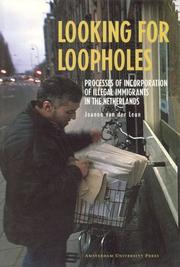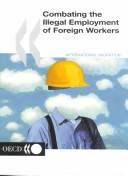| Listing 1 - 10 of 35 | << page >> |
Sort by
|

ISBN: 9681205588 6075640444 Year: 1994 Publisher: El Colegio de México
Abstract | Keywords | Export | Availability | Bookmark
 Loading...
Loading...Choose an application
- Reference Manager
- EndNote
- RefWorks (Direct export to RefWorks)
Ésta es una macrohistoria de México, desde la perspectiva de los extranjeros que inmigraron al país y de los mexicanos que emigraron de él, basada mayormente en fuentes primarias impresas, fuentes inéditas y monografías. En el tercer volumen (1910-1970) se estudia la Revolución mexicana, boxer según los extranjeros afectados por ella, nacionalista según el gobierno mexicano y grandes sectores populares. En la década de los veinte regresa a México buen número de mormones que se habían refugiado en Estados Unidos, y llegan menonitas, judíos, sirios y libaneses, principalmente. La crisis de 1929 expulsó a muchos mexicanos de Estados Unidos y a muchos chinos de México, sobre todo del noroeste. Con la explosión demográfica y la segunda guerra mundial cobra una fuerza aún mayor la emigración de los braceros a Estados Unidos. Sin embargo, en la década de los cuarenta llegan los españoles republicanos; a partir de los cincuenta, estadunidenses jubilados, y en los setenta veteranos de la guerra de Vietnam.
Aliens --- Mexicans --- History. --- Mexico --- History --- Ethnology --- Enemy aliens --- Expatriates --- Foreign citizens (Aliens) --- Foreign population --- Foreign residents --- Foreigners --- Noncitizens --- Resident aliens --- Unnaturalized foreign residents --- Persons --- Deportees --- Exiles --- Immigrants --- Refugees --- Legal status, laws, etc. --- Illegal aliens --- Illegal immigrants --- Non-citizens --- Unauthorized immigrants --- Undocumented aliens --- Undocumented immigrants --- History of the Americas

ISBN: 968120557X 6075640339 Year: 1994 Publisher: El Colegio de México
Abstract | Keywords | Export | Availability | Bookmark
 Loading...
Loading...Choose an application
- Reference Manager
- EndNote
- RefWorks (Direct export to RefWorks)
Ésta es una macrohistoria de México, desde la perspectiva de los extranjeros que inmigraron al país y de los mexicanos que emigraron de él, basada mayormente en fuentes primarias impresas, fuentes inéditas y monografías. En el segundo volumen, ya establecida la libertad de cultos, se abre una atmósfera liberal que disminuye el problema de escoger entre inmigrantes sajones y latinos. Entre los primeros sobresale la colonización mormona; entre los segundos, la italiana. El tradicional recelo frente a los estadunidenses transforma la xenofilia en xenofobia. Además, la creciente salida de braceros a Estados Unidos confirma que México es un país de emigración y no de inmigración.
Aliens --- Mexicans --- History. --- Mexico --- History --- Ethnology --- Enemy aliens --- Expatriates --- Foreign citizens (Aliens) --- Foreign population --- Foreign residents --- Foreigners --- Noncitizens --- Resident aliens --- Unnaturalized foreign residents --- Persons --- Deportees --- Exiles --- Immigrants --- Refugees --- Legal status, laws, etc. --- Illegal aliens --- Illegal immigrants --- Non-citizens --- Unauthorized immigrants --- Undocumented aliens --- Undocumented immigrants --- History of the Americas

ISBN: 9681205561 6075640320 Year: 1993 Publisher: El Colegio de México
Abstract | Keywords | Export | Availability | Bookmark
 Loading...
Loading...Choose an application
- Reference Manager
- EndNote
- RefWorks (Direct export to RefWorks)
Ésta es una macrohistoria de México, desde la perspectiva de los extranjeros que inmigraron al país y de los mexicanos que emigraron de él, basada mayormente en fuentes primarias impresas, fuentes inéditas y monografías. En el primer volumen se estudia desde la victoria de Santa Anna y de Mier y Terán que impidió la reconquista española en 1829; la independencia de Texas (1836); la victoria francesa de 1838 y la estadunidense, una década después, hasta las diversas inmigraciones de franceses, barcelonetes, belgas, italianos e incluso rusos, pasando por los cien mil mexicanos que se convirtieron en extranjeros en su propia tierra.
Aliens --- Mexicans --- History. --- Mexico --- History --- Ethnology --- Enemy aliens --- Expatriates --- Foreign citizens (Aliens) --- Foreign population --- Foreign residents --- Foreigners --- Noncitizens --- Resident aliens --- Unnaturalized foreign residents --- Persons --- Deportees --- Exiles --- Immigrants --- Refugees --- Legal status, laws, etc. --- Illegal aliens --- Illegal immigrants --- Non-citizens --- Unauthorized immigrants --- Undocumented aliens --- Undocumented immigrants --- History of the Americas
Book
ISBN: 1351689800 1315169738 1351689797 1138049182 0367888807 9781351689809 9781315169736 9781351689793 Year: 2017 Publisher: London [England] ; New York, New York : Routledge,
Abstract | Keywords | Export | Availability | Bookmark
 Loading...
Loading...Choose an application
- Reference Manager
- EndNote
- RefWorks (Direct export to RefWorks)
Noncitizens have always been present in liberal political philosophy. Often hard to situate within traditional frameworks that prioritise citizenship, noncitizens can appear voiceless and rightsless, which has implications for efforts towards global justice and justice in migration. This book proposes an alternative. Noncitizenism identifies an analytical category of noncitizenship. While maintaining the importance of citizenship, noncitizenship is another form of special individual-State relationship. It operates far from a State, at its borders, and within its territory, providing a tool for examining the continuity between sites of engagement and the literatures, questions, and conclusions relating to them. The book argues that an accurate liberal theoretical framework, and one which can address contemporary challenges, must acknowledge the political relationship of noncitizenship between individuals and States. This book is for students and scholars of political philosophy and for those interested in noncitizenship and how it can inform the response of liberal theory, citizenship, global justice, migration studies, political theory and policy work.
Aliens --- Citizenship --- Philosophy. --- Enemy aliens --- Expatriates --- Foreign citizens (Aliens) --- Foreign population --- Foreign residents --- Foreigners --- Noncitizens --- Resident aliens --- Unnaturalized foreign residents --- Persons --- Deportees --- Exiles --- Immigrants --- Refugees --- Legal status, laws, etc. --- Illegal aliens --- Illegal immigrants --- Non-citizens --- Unauthorized immigrants --- Undocumented aliens --- Undocumented immigrants
Book
ISBN: 1108914993 1108843174 1108910823 1108910254 9781108910828 9781108910255 9781108914994 Year: 2017 Publisher: Cambridge : Cambridge University Press,
Abstract | Keywords | Export | Availability | Bookmark
 Loading...
Loading...Choose an application
- Reference Manager
- EndNote
- RefWorks (Direct export to RefWorks)
States have long denied basic rights to non-citizens within their borders, and international law imposes only limited duties on states with respect to those fleeing persecution. But even the limited rights previously enjoyed by non-citizens are eroding in the face of rising nationalism, populism, xenophobia, and racism. Beyond Borders explores what obligations we owe to those outside our political community. Drawing on contributions from a broad variety of disciplines - from literature to political science to philosophy - the volume considers the failures of law and politics to guarantee rights for the most vulnerable and attempts to imagine new forms of belonging grounded in ideas of solidarity, empathy, and responsibility in order to identify a more robust basis for the protection of non-citizens at home and abroad. This title is also available as Open Access on Cambridge Core.
Aliens --- Human rights --- Enemy aliens --- Expatriates --- Foreign citizens (Aliens) --- Foreign population --- Foreign residents --- Foreigners --- Noncitizens --- Resident aliens --- Unnaturalized foreign residents --- Persons --- Deportees --- Exiles --- Immigrants --- Refugees --- Legal status, laws, etc. --- Illegal aliens --- Illegal immigrants --- Non-citizens --- Unauthorized immigrants --- Undocumented aliens --- Undocumented immigrants --- citizenship --- human rights --- refugees --- immigrants --- undocumented workers --- migrants
Book
ISBN: 9789089643704 9789048515165 9789048512959 9048512956 9048515165 9089643702 9786613334497 1283334496 Year: 2011 Publisher: Amsterdam : Amsterdam University Press
Abstract | Keywords | Export | Availability | Bookmark
 Loading...
Loading...Choose an application
- Reference Manager
- EndNote
- RefWorks (Direct export to RefWorks)
The pieces in this volume offer fresh approaches to a variety of debates over migration policy. The authors of these essays explore migration policymaking in ten European countries, looking at the way social scientists and politicians form and implement these policies. Migration Policymaking in Europe contains original insights and in-depth comparative analyses drawing on a variety of empirical evidence. By placing these policies in the context of historical relationships between nations, the editors of this book have put forth a vital new portrait of the principles guiding migration in Europe.
Migration. Refugees --- Europe --- Foreign workers --- Illegal aliens --- Migratiebeleid. --- Government policy --- EU-landen. --- Undocumented immigrants --- European Union countries --- Emigration and immigration. --- Emigration and immigration --- Government policy. --- Alien labor --- Aliens --- Foreign labor --- Guest workers --- Guestworkers --- Immigrant labor --- Immigrant workers --- Migrant labor (Foreign workers) --- Migrant workers (Foreign workers) --- Employees --- Employment --- Aliens, Illegal --- Illegal immigrants --- Illegal immigration --- Undocumented aliens --- Alien detention centers --- Human smuggling --- Legal status, laws, etc. --- Noncitizen labor --- Noncitizens --- Children of illegal aliens --- Illegal alien children --- Irregular migration --- Unauthorized immigration --- Undocumented immigration --- Women illegal aliens --- Noncitizen detention centers --- Enemy aliens --- Expatriates --- Foreign population --- Foreign residents --- Foreigners --- Non-citizens --- Resident aliens --- Unauthorized immigrants --- Unnaturalized foreign residents --- Persons --- Undocumented Immigrants --- Illegal immigration. --- Unauthorized Immigrants --- Undocumented Aliens --- Undocumented Workers --- Alien, Undocumented --- Aliens, Undocumented --- Immigrant, Unauthorized --- Immigrant, Undocumented --- Immigrants, Unauthorized --- Immigrants, Undocumented --- Unauthorized Immigrant --- Undocumented Alien --- Undocumented Immigrant --- Undocumented Worker --- Worker, Undocumented --- Workers, Undocumented

ISBN: 9053566007 9786610958894 9048505208 1280958898 0585495327 9780585495323 9789048505203 9781280958892 9789053566008 6610958890 Year: 2003 Publisher: Amsterdam : Amsterdam University Press,
Abstract | Keywords | Export | Availability | Bookmark
 Loading...
Loading...Choose an application
- Reference Manager
- EndNote
- RefWorks (Direct export to RefWorks)
Looking for Loopholes is a detailed account of how illegal immigrants manage to integrate into Dutch society. Drawing on long-term research in the four largest cities in the Netherlands, van der Leun discusses illegal immigration's relationships with illegal employment and criminal involvement, as well as aspects of education, housing, health care and police surveillance. Throughout, she combines the perspectives of immigrants with that of those who implement policies to discourage them, revealing growing tensions between restrictive rules and day-to-day reality.
Illegal aliens. --- Immigration & Emigration --- Political Science --- Law, Politics & Government --- Illegal aliens --- Social conditions. --- Employment --- Aliens --- Aliens, Illegal --- Illegal immigrants --- Illegal immigration --- Undocumented aliens --- Legal status, laws, etc. --- Alien detention centers --- Human smuggling --- Undocumented immigrants --- Unauthorized immigrants --- Social conditions --- Noncitizens --- Enemy aliens --- Expatriates --- Foreign population --- Foreign residents --- Foreigners --- Non-citizens --- Resident aliens --- Unnaturalized foreign residents --- Persons --- Foreign workers --- Children of illegal aliens --- Illegal alien children --- Irregular migration --- Unauthorized immigration --- Undocumented immigration --- Women illegal aliens --- Emigration and immigration --- Noncitizen detention centers --- Undocumented Immigrants --- Illegal immigration. --- Unauthorized Immigrants --- Undocumented Aliens --- Undocumented Workers --- Alien, Undocumented --- Aliens, Undocumented --- Immigrant, Unauthorized --- Immigrant, Undocumented --- Immigrants, Unauthorized --- Immigrants, Undocumented --- Unauthorized Immigrant --- Undocumented Alien --- Undocumented Immigrant --- Undocumented Worker --- Worker, Undocumented --- Workers, Undocumented --- sociology --- sociologie --- IMMIGRATION CLANDESTINE --- CONDITIONS SOCIALES --- EMPLOI / TRAVAIL --- PAYS-BAS --- Employment.
Book
ISBN: 9053507000 905714025X 9789053507001 Year: 1998 Publisher: Leuven,
Abstract | Keywords | Export | Availability | Bookmark
 Loading...
Loading...Choose an application
- Reference Manager
- EndNote
- RefWorks (Direct export to RefWorks)
Sociology of minorities --- Immigratie --- Immigration --- Nederland --- Pays-Bas --- Aliens --- -Minorities --- -Social integration --- -#A9808A --- Inclusion, Social --- Integration, Social --- Social inclusion --- Sociology --- Belonging (Social psychology) --- Ethnic minorities --- Foreign population --- Minority groups --- Persons --- Assimilation (Sociology) --- Discrimination --- Ethnic relations --- Majorities --- Plebiscite --- Race relations --- Segregation --- Enemy aliens --- Expatriates --- Foreign citizens (Aliens) --- Foreign residents --- Foreigners --- Noncitizens --- Resident aliens --- Unnaturalized foreign residents --- Deportees --- Exiles --- Immigrants --- Refugees --- Social conditions --- Legal status, laws, etc. --- Minorities --- Social integration --- #A9808A --- Illegal aliens --- Illegal immigrants --- Non-citizens --- Unauthorized immigrants --- Undocumented aliens --- Undocumented immigrants
Book
ISBN: 9089640495 9786612453830 1282453831 9048506344 9789089640499 9789048506347 Year: 2009 Publisher: Amsterdam : Amsterdam University Press,
Abstract | Keywords | Export | Availability | Bookmark
 Loading...
Loading...Choose an application
- Reference Manager
- EndNote
- RefWorks (Direct export to RefWorks)
A comprehensive book on the relation between crime and illegal residence.
Illegal aliens --Netherlands. --- Public safety --Netherlands. --- Public safety --- Illegal aliens --- Aliens --- Aliens, Illegal --- Illegal immigrants --- Illegal immigration --- Undocumented aliens --- Safety, Public --- Legal status, laws, etc. --- Alien detention centers --- Human smuggling --- Human services --- Undocumented immigrants --- Enemy aliens --- Expatriates --- Foreign population --- Foreign residents --- Foreigners --- Non-citizens --- Noncitizens --- Resident aliens --- Unauthorized immigrants --- Unnaturalized foreign residents --- Persons --- Children of illegal aliens --- Illegal alien children --- Irregular migration --- Unauthorized immigration --- Undocumented immigration --- Women illegal aliens --- Emigration and immigration --- Noncitizen detention centers --- Illegal immigration. --- Niederlande --- sociologie --- public administration --- bestuurskunde --- sociology

ISBN: 926418239X 9264185151 Year: 2000 Publisher: Paris, Cedex, France : OECD,
Abstract | Keywords | Export | Availability | Bookmark
 Loading...
Loading...Choose an application
- Reference Manager
- EndNote
- RefWorks (Direct export to RefWorks)
The fight against the illegal entry, residence and employment of foreigners is one of the key priorities of the immigration policies of the OECD countries. This irregular migration continues to persist, albeit at different levels for different receiving countries, both in countries that have expressed a political will to manage migration flows more effectively and to fight against the trafficking of labour, and in those that continue to receive a large number of immigrants every year as part of an active policy to recruit permanent migrant workers. In the light of the growing role of trafficking networks and their increasingly active involvement in moving labour across international boundaries, enhanced co-operation at both national and international levels is required to develop policies for preventing and combating the employment of foreigners in an irregular situation. In particular, whatever is done to combat the hiring of illegal immigrants must address the problem of undeclared work in general, and not just the employment of illegal immigrants per se. Better information on the risks and penalties involved in the use of illegal labour should also be directed at both employers and workers in industries where these illegal practices are prevalent, but also at employers that resort to the use of undeclared labour only on an occasional basis and at sending countries. Various specific measures adopted by a number of Member countries, such as the requirement to notify relevant government agencies prior to hiring, fiscal incentives for the employment of legal workers or the streamlining of hiring formalities, might be applied in a larger number of countries. The forging of partnerships between the relevant government agencies and employers’ and employees’ associations in each country should also be encouraged, together with the extension of international co-operation to control and manage immigration flows more effectively.
Emigration and immigration law -- OECD countries. --- Foreign worker certification -- OECD countries. --- Foreign workers -- OECD countries. --- Illegal aliens -- OECD countries. --- Illegal aliens --- Aliens --- Aliens, Illegal --- Illegal immigrants --- Illegal immigration --- Undocumented aliens --- Alien detention centers --- Human smuggling --- Legal status, laws, etc. --- Undocumented immigrants --- Enemy aliens --- Expatriates --- Foreign population --- Foreign residents --- Foreigners --- Non-citizens --- Noncitizens --- Resident aliens --- Unauthorized immigrants --- Unnaturalized foreign residents --- Persons --- Children of illegal aliens --- Illegal alien children --- Irregular migration --- Unauthorized immigration --- Undocumented immigration --- Women illegal aliens --- Emigration and immigration --- Noncitizen detention centers
| Listing 1 - 10 of 35 | << page >> |
Sort by
|

 Search
Search Feedback
Feedback About UniCat
About UniCat  Help
Help News
News